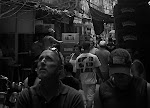
Abdelkader has been missing since Saturday, when he was abducted with fellow Tabacs TV cameraman Yousif Badi while covering the first national election in Libya in 60 years.
Abdelkader and I met a little over a week ago while helping a friend, photographer Andre Liohn, stage a photo exhibition in Misrata, Libya, called Almost Dawn in Libya. The exhibition, which moves to Tripoli this week, was conceived as a way to help heal Libya through shared imagery of the war.
By all rights Abdelkader should not have been there. As we hung photos I noticed a prominent scar on his neck, and when I asked about it he told an amazing story of personal survival during the 2011 war.
Abdelkader is a slightly-built guy, 26, who worked as a documentary cameraman for the rebels during Misrata’s five-month military siege. Last June, as he turned his head while filming, he was shot in the neck by a Kalashnikov at close range. His scar bisects his throat, and there is a corresponding, hand-size exit-wound scar on the back of his shoulder. It was the third time he’d been shot during the war. His cousin fashioned a compress over the wound using his headscarf and they got Abdelkader to the field hospital in time. Along the way, he dreamed of people he knew who have died. He was in a coma for a week.
Abdelkader is a bright, hard-working, cheerful guy whose face invariably lights up in greeting. During the exhibition I met one of his brothers, who favors him and has the same high-pitched voice, and when I mentioned Abdelkader’s remarkable survival, he smiled and said, “It was a kind of magic.”

On Saturday, Abdelkader and Yousif were kidnapped by militiamen near the town of Ben Walid while covering the elections there. Their captors have since demanded release of prisoners held in Misrata -- or so it is said; the details are sketchy.
There is no effective government in Libya right now, and the National Transitional Council has limited control over the militias that rule the cities and countryside, some of which supported the revolution and some of which didn’t.
The consensus among my friends and contacts is that the abduction was an outgrowth of an old feud between Misrata and the Bani Walid-Warfalla desert faction. An attack by the Misrata militia has been discussed as a way to attempt their release, but at this point there are few hard facts aside from the abduction itself.
The video his captors posted of Abdelkader trying to negotiate with them is distressing, to say the least. No one expected recreating Libya to be an easy ride, but abducting journalists covering the first elections in 60 years isn’t a good way to start.
Illustration by Ahmed Shlak
